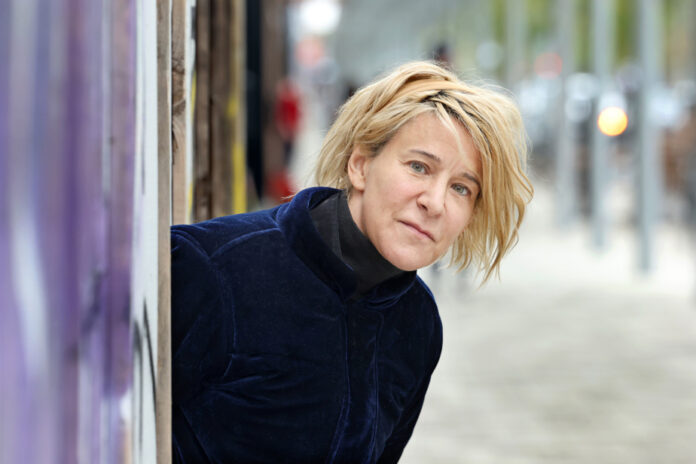For a long time, Marie-Jo Thério believed that she no longer needed to make music. Until one day she realized that – bullshit! – she told herself stories. Here she is again on stage in Montreal with the material from La maline, her great album from the year 2000. This reunion will inevitably be magnetic.
There is something wild about Marie-Jo Thério. The artist in her protects her freedom, while the woman has something of an adventurer. She has her roots in New Brunswick, but lives between Quebec, France, the Basque Country and Costa Rica. By following your instinct rather than a career plan.
“I get tired of myself very quickly,” she says. If someone tells me: “This is something that works, we can do things like this or like that”, I will surely find a way to save myself. » She has no need to see her name at the top of a poster.
Its authenticity is its most precious asset and it is also what makes us adhere to the worlds it offers. There is no one as tender and crazy as her, no one as funny and touching, no one as whole and magnetic. His presence, of rare quality, is one of his great assets, on stage as well as in interviews in a pub in the Plaza Saint-Hubert.
Let’s go back. In 2000, Marie-Jo Thério launched La maline, an album concocted with Bernard Falaise and Éric West-Millette which talks about travel and which does not stand still musically. Its essence is folk, with a bit of country, but seen in an eminently personal spirit of modernity. A universe which contrasted radically with Comme de la musique (1995), a record where it had been a little cramped in the formats of the time.
The success was significant: more than 50,000 copies of La maline were sold. She also created a show called Arbre à fruits, which literally wowed those who were lucky enough to attend it. In December 2001, when her tour was ending, La Presse named Marie-Jo Thério as one of its artists of the year.
It is these songs, including Café Robinson, T’es le beau Raphaël, L’oiseau de paradis, Another Love Song About Paris, that the singer-songwriter will perform at the Cinquième Salle at Place des Arts until Saturday . In doing so, she reconnects with Freddy, this young girl “a little naive”, “a little helpless in the face of everyday life”, intense and surly at the idea of walking on the beaten paths, who is a bit like the alter ego of the creative.
“Maybe Freddy served me not as a shield, but let’s say as a friendly fan, which I brandished in front of people saying: it doesn’t matter, it’s just Freddy,” she says, aware that the freedom that she displayed 20 years ago was quite rare in song for a young woman.
There were in fact quite a few singer-songwriters at the end of the 1990s: Mara Tremblay, Sylvie Paquette (who is coming back these days) and… her. It was a time when, says the creator of La Maline, women had to justify not being vocal singers. Which makes her even more delighted with the guts of Lou-Adriane Cassidy, Ariane Roy and others these days.
“There’s not the same condescension anymore, because 25-year-old girls wouldn’t allow it. There’s no way! she exclaims. Whereas we had to meander a little more, to show psychology in working with the musicians. It’s really cool what’s happening with 20-year-old women today. »
Marie-Jo Thério retains something fierce and young, despite approaching sixty. She has the same voice, the same curious liveliness, the same thirst for things that make sense as 20 years ago. She claims the right to live “with a question mark on my forehead” rather than certainties.
Reconnecting with the stage proves to be a breath of life. “Everything that constitutes me can be expressed there: the actress in me is satisfied,” she rejoices, “and the musician is able to be more explosive in her dialogue with the other musicians. » Finding those who love her songs turns out to be a “jubilant” experience for the creator… who has long tried to convince herself that being a singer is over for her.
“I was pretending that I had no need to play music for the last 10 or 15 years I’ve been going to Costa Rica regularly,” she says. There’s music everywhere – reggae, calypso, music to die for – and I just have to receive it. So I told myself that I didn’t need to do it. »
She thought so, until she realized that – bullshit! – she was fooling herself. “I was in denial of a real desire,” she understands today. A denial all the stronger since a stupid accident that occurred at the start of the pandemic left her “djangoreinhardtized”, as she says. That is to say with the fingers of one hand less mobile than before.
Hence the presence of pianist Alexis Dumais within his group also including drummer Vincent Carré and his old accomplices Bernard Falaise and Érik West-Millette. “The worst thing in the world is to make up your mind,” she judges. Does this mean that Marie-Jo Thério is back for good? “We’ll see,” she said, smelling the trap. In the present moment, it’s a beautiful moment. »















